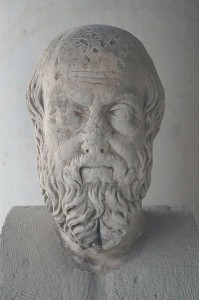Herodotus (6)
Herodotus of Halicarnassus (c.480-c.429 BCE): Greek researcher, often called the world's first historian. In The Histories, he describes the expansion of the Achaemenid Empire under its kings Cyrus the Great, Cambyses, and Darius I the Great, culminating in Xerxes' expedition to Greece (480 BCE), which met with disaster in the naval engagement at Salamis and the battles at Plataea and Mycale. Herodotus' book also contains ethnographic descriptions of the peoples that the Persians have conquered, fairy tales, gossip, and legends.
Topographer and Ethnographer

Herodotus describes amazing customs and habits, and sometimes it is hard to believe him. The Agathyrsi have their women in common, so that they may all be brothers, and, as members of a single family, be able to live together without jealousy and hatred. The Argippaeans are bald. Sacred prostitution is a custom in Babylon. Lydian men don't like to be seen naked. The Neuri can change into werewolves.
Every five years, the Thracians choose one of their number by lot and send him to God as a messenger, with instructions to ask him for whatever they may happen to want; to effect the dispatch, some of them with javelins in their hands arrange themselves in a suitable position, while others take hold of the messenger by his hands and feet, and swing him up into the air in such a way as to make him fall upon the upturned points of the javelins.note
Herodotus describes all these customs without any trace of bias. Although he is proud to be a Greek and sometimes expresses his surprise about foreign customs, he does not criticize them. (After his death, some of his compatriots were to accuse Herodotus of 'philobarbarism', loving the barbarians.)
His respect for other cultures does not mean that he swallows everything. Herodotus sometimes seems to be a bit gullible, but this is just a corollary of his method. Sometimes, he was unable to find a text or a reliable spokesman about an event or place. In those cases, he simply retold the available legends and fairy tales; he usually shows that he does not believe them ('This is what they say, but in my opinion it is just one of those tall stories of the Egyptians').
Not everybody recognized Herodotus' criticism, and we have already seen that in Antiquity and the Middle Ages, he was called Father of Lies. In the sixteenth century, however, it became clear how much variance there is in human behavior. The Aztecs sacrificed humans. Matrilinearity was usual among the Iroquois. The Calmucs were bald. Promiscuity was usual in Samoa. The Siberians told stories about shamans who were able to change into wolves. After these discoveries, the Father of Lies could become the Father of Anthropology.
As a topographer, Herodotus has his merits, too. He was the first to understand the relative size and situation Europe, Africa and Asia. He was aware of the fact that the Caspian Sea was surrounded on all sides by land, and knew reports about the circumnavigation of Africa. (Go here for the story, which was generally questioned until Bartolomeus Diaz reached the Cape of Good Hope in 1488.) Herodotus knew that the world was tens of thousands year old;;note; something that was unacceptable to the scientists of the Christian Middle Ages.

Sometimes, he is mistaken. For example, he believes that the world is symmetrical. When he compares the Danube and the Nile, he points out that they both divide a continent in two halves, and that their deltas are on the same geographical longitude. Since it is - according to Herodotus - well-known that the sources of the Danube are in the far west, in the Pyrenees, he is positive that the sources of the Nile must be in the west too, in the Atlas mountains. And because the Danube has five mouths, two of the seven branches of the Nile must be canals. This symmetry is not complete: Herodotus knows that it is cold in the north and warm in the south.
Between these extremes is Greece, where the climate is very pleasant. The fact that there is an unpleasant climate at the ends of the (flat) earth, is compensated by the natural richness of those far-off lands: cinnamon, gold, tin, amber and all the perfumes of Arabia.
Greece is the midpoint of the earth, and the countries that are furthest from Greece have the strangest customs. Thracians weep when a child is born, and are very glad when somebody dies. Indian men have black semen. In the extreme north, there are people who eat other people. Egyptians and Thracians have customs that are the exact opposite of Greek customs. The list of reversals is endless.